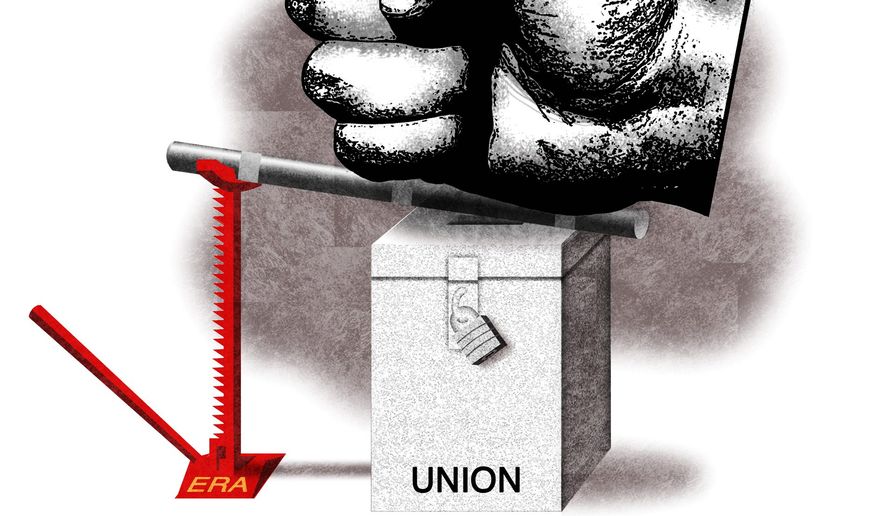OPINION:
Congressional and Senate candidates are off to the races for the midterm elections. Billions of dollars will be spent leading up to November to fund political operations and advocacy. And if history is any indication, labor unions and their bloated bank accounts will be intimately involved.
Beyond supplying campaigns with foot soldiers, since 2010, unions have spent more than $1.6 billion in members’ dues money (typically without their agreement) to benefit left-wing special interests. Money that went to conservative or bipartisan causes represented a comparative very small drop in the bucket. Keep in mind this is in addition to the hundreds of thousands of PAC dollars unions sent to political candidates — again overwhelmingly Democrats.
Were these facts well-publicized, they would generate outrage among union members considering 40% voted Republican in 2020. They represent the wide gap between the agenda of union bosses and the workers that fund their salaries and activities.
Legislation reintroduced this week can help empower workers and protect their freedom of choice regarding political spending and beyond. Sponsored by Sen. Tim Scott, the Employee Rights Act of 2022 will shepherd labor law into the 21st century. And it’s an idea that is way past its due date: laws on union accountability haven’t changed significantly in over 60 years.
Among the provisions, the ERA would require union members to consent before their union dues are spent on anything other than collective bargaining efforts.
The legislation guarantees that votes to join a union or hold a strike are done via secret ballots, rather than a system where union organizers openly solicit for your binding vote. This system of signing or refusing to sign at the request of union organizers subjects employees to well-documented intimidation tactics that would never be allowed in secret ballot elections for public office. In his State of the Union address, President Biden acknowledged that votes on tax increases in Congress would be different if members could vote their true preference by secret ballot.
The bill also provides employees with email and phone privacy protections and insulates workers who have lost confidence in their union and are working to remove it. This is necessary considering that under current law removing a union that has been in place for longer than any current employees have been alive is still incredibly difficult.
Beyond guardrails to protect employees from bad actor unions, the ERA solidifies the autonomy of independent workers and some small business owners.
Currently, employers are limited in what benefits they can offer to independent contractors, as opposed to full-time employees. The ERA would give these self-employed contractors (think Uber, DoorDash and personal grocery shoppers) the opportunity to receive extra benefits while maintaining the decision-making power of choosing where, when and how much to work. This provision is especially important as the modern economy is increasingly shifting towards gig economy jobs that offer maximum flexibility.
The ERA also clarifies the Labor Department’s “joint employer” standard, so liability concerns of a franchisor or franchisee do not spill over to the other. The U.S. franchise system covers millions of employees in more than 750,000 small businesses nationwide. The franchise framework provides so many budding entrepreneurs with the opportunity to run their businesses and provide jobs that might not otherwise exist.
Outside of Nancy Pelosi and Chuck Schumer’s posse in Washington, the ERA is not controversial. The elements are broadly popular among both union and nonunion members.
Seventy-six percent of union households support giving workers the right to secret ballot elections for union certifications. Nearly two-thirds agree franchisee small businesses should retain separate control of their operations. And 67% of union households believe gig economy workers should be able to receive benefits like health care from a business partner without losing the flexibility of being an independent contractor.
Two-thirds of the Senate should join Sen. Scott in helping to make the ERA a reality. Even Mr. Biden would support it if he could vote in private.
• Richard Berman is president of Berman and Co. in Washington.




Please read our comment policy before commenting.